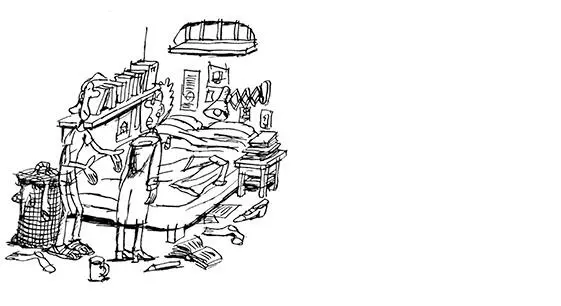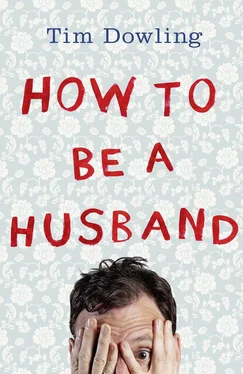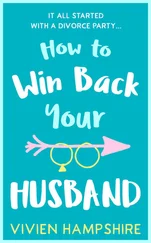But, I hear you ask, are you a good husband? Ultimately that is for my wife alone to judge, but I think I know what she would say: no. Still, I can’t help feeling there’s a longer answer, a more considered, qualified way of saying no. If nothing else, I can look back and point out the detours round some of the pitfalls I was fortunate enough to overstep, and relate a few cautionary tales about the ones I fell headlong into.
When the well-off and the well-known retrace their path to success for the benefit of people seeking to follow their lead, the accounts tend to be coloured by ‘survivorship bias’ – they simply don’t reckon with the examples of thousands of other people who followed a similar route and ended up nowhere. In hindsight success can look like a repeatable formula comprised of hard work and a series of canny decisions. No entrepreneur ever wrote a memoir that said, ‘Then I did something terribly risky and not all that clever, but once again fortune chose to reward my stupidity.’
I don’t have the luxury of revealing the secret of my success, even in hindsight. I didn’t get where I am today – husband, father, gainfully employed person – by executing a deliberate strategy. I got where I am today by accident. One cold winter’s evening twenty-four years ago, my life jumped its tracks without warning. As far as I’m concerned, all I did was hang on.
My successful marriage is built of mistakes. It may be founded on love, trust and a shared sense of purpose, but it runs on a steady diet of cowardice, impatience, ill-advised remarks and low cunning. But also: apologies, belated expressions of gratitude and frequent appeals for calm. Every day is a lesson in what I’m doing wrong. Looking back over the course of twenty years it’s obvious the only really smart thing I did was choose the right person in the first place, and I’m not certain I did that on purpose.
And even if I did choose wisely, I also had to be chosen. How often does that happen? This is what I’m saying: luck, pure and simple.
 1. THE BEGINNING
1. THE BEGINNING
It is a few days after Christmas, 1989. I am living in New York, working in a dead-end job. It’s worse than that; I’m employed by the production department of a failing magazine. I probably won’t even have my dead-end job for much longer.
I’ve just taken the train in from my parents’ house in Connecticut. It’s cold, and the city has an air of spent goodwill: there are already Christmas trees lying on the pavement. I drop by the apartment of some friends, two girls who share a grand duplex in the West Village. I know they have people visiting, English people. But when I get there my friend Pat – who is himself English but lives in New York – answers the door. He gives me to understand that the two roommates are in the basement having a protracted disagreement. They argue a lot, those two, and have a tendency towards high drama.
I first see the English girl as she comes up from downstairs, where she has been attempting, in vain, to broker some sort of truce and salvage the evening. Her short hair, charged with static, is riding up on itself at the back. She walks into the room, pauses to light a cigarette, and then looks at me and Pat.
‘It’s like a fucking Sartre play down there,’ she says.
We all go out to a bar. The English girl has a bright red coat and swears a lot. Her voice is husky, lower than mine. She is at once afraid of everything – she thinks she’s going to be murdered on the streets of Greenwich Village – and nothing. She is funny and charming, but also peremptory and unpredictable, with shiny little raisin eyes.
‘So,’ I say, turning to her, ‘how long are you here for?’
‘Look,’ she says, appraising me coolly. ‘It’s almost as if we’re having a conversation.’
If I’m honest, she scares the shit out of me. But by the end of the evening I very badly want the English girl to be my girlfriend. My plan is to engineer this outcome as quickly as possible.
There are a few flaws in my plan: the English girl lives in London, and I live in New York; I already have a girlfriend of some four years’ standing; the English girl does not appear to like me.
Nevertheless, at a New Year’s Eve party a few days later, after several hours of the sort of unrelenting flirtation that might better be characterized as lobbying, I convince her to kiss me. She doesn’t seem terribly flattered by my persistence, but I suppose a man who arranges to spend New Year’s Eve apart from his actual girlfriend so he can try it on with a comparative stranger is, first and foremost, a heel. She has every reason to be circumspect.
I’m not normally this decisive, or resolute, or forward. A born torch-bearer, I managed to keep my feelings completely hidden from the first three girls I fell in love with: Sarah, aged eight, who eventually moved away; Paula, aged ten, who also moved away, and Cati, aged eleven, who refused to do me the kindness of moving away. I’d come to understand love as an exquisite private pain by the time Jenni, aged fifteen, cornered me long enough to become my first girlfriend.
It’s not that I’d never pursued anyone before; I just normally did it in a way that took the object of my affections a very long time to notice. I preferred to play it cool: waiting around in places where the girl I fancied might possibly turn up later, that sort of thing. This way I left myself an exit strategy whenever rejection presented itself – the paper trail of my courtship was non-existent – although in most cases the girl in question simply found another boyfriend while my long game was still unfurling.
I don’t have time for any of that now. I have just two weeks to break up with my girlfriend and convince the English girl that she should not only like me, she should take me back to England with her.
It is a difficult fortnight. The English girl’s lacerating wit makes her a very hard person to have a crush on. We go out together several times, but we drink so much that I often have to reacquaint her with our relationship’s forward progress the next morning. You like me now, I tell her. It’s all been agreed.
I also discover I have rivals, including a guy who engineers sound systems for nightclubs and who, she tells me, has a gun in the glove box of his pick-up truck. I can’t compete with that. I don’t have a gun, or a glove box to put it in.
I break up with my girlfriend one evening after work, in a bar called the Cowgirl Hall of Fame, an episode of shameful expediency I hope won’t haunt me for the rest of my life, but it does a little. I have to ask for the bill while she’s crying, because I have a date.
This is not how I usually break up with people: directly, implacably, while sitting on one hand to stop myself looking at my watch. In fact I don’t have a usual method; I’ve never needed to develop a technique. Girls break up with me. That’s what happened the last time, and the time before that, and the time before that.
After hailing a cab for my weeping ex-girlfriend, I walk to a bar – the same bar as that first night – where the English girl is waiting for me. We are meeting here because our mutual friends do not approve of our burgeoning romance. They see me, not without cause, as an opportunist. The English girl has only recently come out of a long relationship – not quite as recently as eight minutes ago, mind – and it is generally acknowledged that I am being reckless with her affections. I only that know I’m being reckless with mine. In any case, I am currently unwelcome at the apartment where the English girl is staying.
Читать дальше

 1. THE BEGINNING
1. THE BEGINNING










